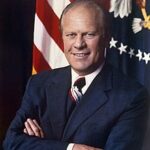The Mayaguez Incident of May 12-15, 1975, marked President Gerald Ford’s defining moment in foreign policy leadership. Cambodian forces seized the American merchant vessel SS Mayaguez in international waters near Koh Tang island. Ford faced his first major international crisis just months after the fall of Saigon.
Swift Presidential Decision-Making
Ford immediately convened the National Security Council within hours of the seizure. The president ordered military action despite congressional opposition and time constraints. ⚠️ Intelligence reports suggested the 40-member crew faced imminent danger or transfer to mainland Cambodia. Ford authorized Operation Mayaguez, involving Marines, Navy forces, and Air Force support. The president prioritized speed over extensive diplomatic negotiations.
Successful Military Operation
American forces launched coordinated attacks on May 15, 1975. Marines assaulted Koh Tang island while Navy vessels intercepted Cambodian boats. 📊 The operation successfully rescued all 39 surviving crew members within 72 hours. Air strikes targeted Cambodian naval bases and airfields simultaneously. The swift military response demonstrated American capability and resolve. Ford’s decision restored confidence in American leadership after Vietnam War disappointments.
Impact:
The Mayaguez Incident response generated immediate positive consequences for American foreign policy and Ford’s presidency. 🌍 International allies praised Ford’s decisive leadership and quick military response. The successful operation contrasted sharply with recent Vietnam War failures and Saigon’s collapse.
Restored Presidential Authority
Ford’s approval ratings surged from 39% to 51% following the successful rescue mission. The president demonstrated executive leadership capabilities during his first major international crisis. 📊 Congressional Democrats initially criticized the military action but later acknowledged its success. The operation restored faith in American military effectiveness after Vietnam setbacks. Ford’s decision-making process became a model for future presidential crisis management.
Enhanced American Credibility
The Mayaguez Incident response reinforced American commitment to protecting citizens abroad. Southeast Asian nations recognized continued American presence and military capability in the region. 🔥 The operation deterred potential future seizures of American vessels by hostile forces. Ford’s swift action demonstrated that post-Vietnam America remained a formidable global power.
Long-term Strategic Benefits
The successful rescue operation strengthened Ford’s position in upcoming 1976 presidential campaign preparations. Military leaders praised the coordinated joint-service operation as tactically successful. The incident established precedents for future hostage rescue operations under subsequent presidents. Ford’s Mayaguez response became a benchmark for presidential crisis leadership in foreign policy situations.
